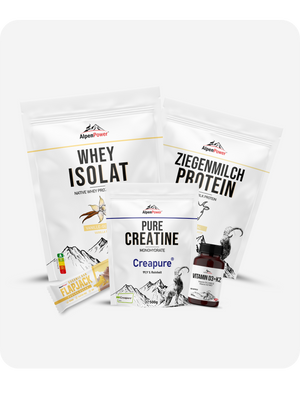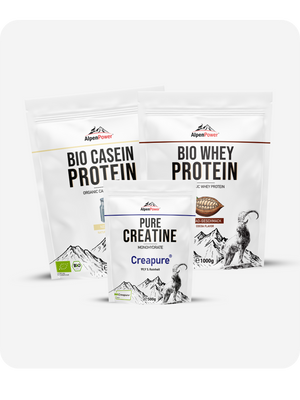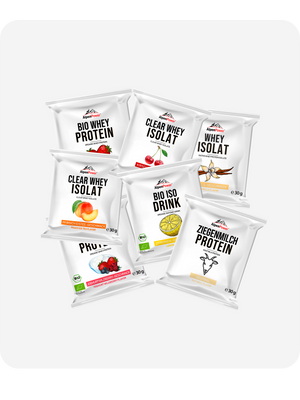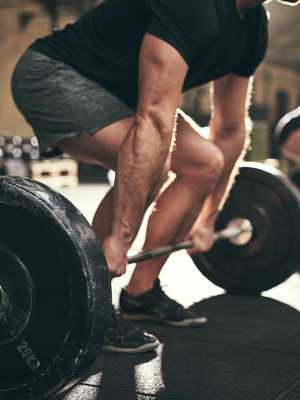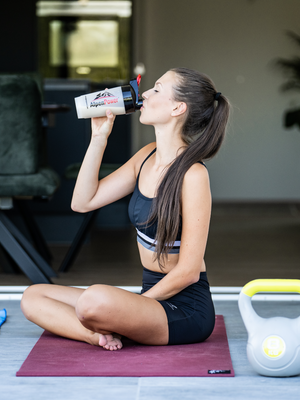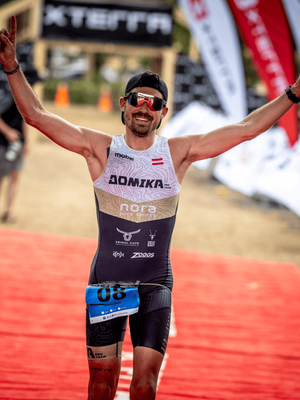Did you know that ...
... the protein requirement is 1.3 to 1.8 g protein per kilogram of body weight - regardless of the type of sport?
... protein alone after training is not enough, but should be combined with carbohydrates?
... there is a "full muscle effect"?
... "a lot helps a lot" does not apply to protein intake?
Protein is considered the most important nutrient in sport when it comes to building muscle, body definition and increasing strength. The range of protein shakes, protein bars and amino acid supplements is therefore growing all the time. For many sports enthusiasts, the motto seems to be: A lot helps a lot. But is that true? Or can too much protein be harmful?
Protein is an energy-providing nutrient (4 kcal per gram) that is needed in the body for many important functions:
- Structure of enzymes, hormones and substances in the immune system
- Component of structural elements (actin and myosin) in muscles and tendons (collagen)
The different protein structures are built up by the body itself from 20 amino acids. Eight amino acids are essential, i.e. indispensable, and must be obtained from food. The remaining twelve amino acids can be produced by the body itself, provided the basic substances are available (especially cysteine and tyrosine). Histidine is only essential for infants.

Protein in food & requirements
Protein is found in both plant and animal foods:
- Animal protein sources: Meat, fish, dairy products, eggs
- Vegetable protein sources: Cereal products, pulses, nuts and seeds
Protein is therefore present in many different foods, so that the protein requirement of healthy adults (0.8 g per kg body weight according to D-A-CH reference values) can be easily met.
Protein requirements in sport
In sport, the need for protein is increased due to the increased energy metabolism and the breakdown processes in the muscles caused by intensive physical exertion. It is not only the quantity of protein that is important, but above all the quality of the protein. In principle, animal protein is of higher quality for the body, as the amino acid composition corresponds better to human body protein.
Plant proteins have a lower content of essential amino acids, which means that larger quantities must be consumed to achieve a similar effect. However, targeted food combinations (e.g. cereals with beans, beans with corn) can also improve the protein quality of plant-based protein sources. Legumes should therefore be included in the diet several times a week as a source of protein.
The protein requirement for sport is 1.3 to 1.8 g protein per kg body weight, regardless of the type of sport.
For an athlete weighing 80 kg who completes 5 training sessions per week, this corresponds to a requirement of 104 to 144 g of protein. Half of this should be obtained from plant-based foods (bread, pastries, pasta, rice, nuts, seeds), the rest can be obtained from animal-based foods and pulses. In this case: 52 to 72 g.
In order to better estimate and plan the protein intake from these foods, animal foods and pulses are calculated as so-called "protein portions":

These protein portions should be divided into three to four meals. A protein intake of 0.2 to 0.3 g of high-quality protein per kg of body weight per meal is ideal. In the case of the example, this means
- With 3 meals a day: 0.3 g protein per meal per kg bw = 24 g protein per meal (=2-2.5 protein portions)
- With 4 meals a day: 0.2 g protein per meal per kg bw = 16 g protein per meal (=1.5 protein portions)
A higher protein intake per meal is not advisable, as from 40 g there is talk of a "muscle-full effect" and the excess protein is not used to build muscle, but is channelled into energy production and fat storage. An extremely high protein intake over a longer period of time is also not advisable due to possible strain on the kidneys, which are responsible for excreting protein breakdown substances.
Protein timing
Three to four meals a day are ideal to provide the body with sufficient protein. One of these meals should be planned as a post-workout meal within 30 to 60 minutes after training, at the latest three to four hours afterwards. The last meal, which should also contain protein, should be eaten shortly before going to bed. This provides optimal support for muscle protein synthesis, which is active for 24 to 48 hours after training. Those who do not sleep well on a full stomach should eat their last meal two to three hours before going to bed so as not to impair regeneration during sleep.
While quickly available protein is recommended after training - especially whey protein, but pea protein or pumpkin seed protein are also possible - slow-digesting protein (casein, soy protein) should be used before going to bed.
You don't necessarily have to use protein powder to make use of these different protein sources. Dairy products contain whey protein and casein and can therefore contribute to the protein supply:

Vegetable protein sources, especially pulses, nuts and seeds, also provide the muscles with sufficient protein.

Due to the lower protein quality of plant-based foods, when eating a plant-based diet, it is particularly important to eat several protein-rich foods throughout the day and to combine them with each other in order to achieve a suitable average daily amino acid profile. In this way, muscle building can also be optimally supported with a plant-based diet.
Protein + carbohydrates
It is not only sufficient protein intake after training that is necessary to improve performance, but also an appropriate intake of carbohydrates. Carbohydrates increase the insulin level in the blood, which reduces catabolic, i.e. catabolic, body processes caused by intensive training. At the same time, this improves protein uptake into the muscle cells.
Example: vegetarian daily meal plan with 6 protein portions, total protein intake 117 g

Summary:
- Protein requirement: 1.3-1.8 g protein per kg body weight regardless of the type of sport
- Half of this is covered by vegetable protein, the rest by animal protein and pulses
- Divide your protein intake into 3-4 meals per day
- 30 to 60 minutes after a workout, provide rapidly available protein (0.2-0.3 g per kg body weight) and carbohydrates
More information about BCAAs (Branched-chain amino acids) awaits you in the next blog post.
Author: Birgit Kogler BSc, dietician: https://www.ernaehrungsberatung-kogler.at/ Info: Would you like professional advice on sports nutrition to help you adapt your diet to your training? You can find a sports dietician near you at www.diaetologen.at/suche.
Sources: Colombani P, Mettler S, Mannhart C. (2019). Nutrition and recovery after training and competition. Swiss Sports Nutrition Society. Online in the WWW at: http://www.ssns.ch/wp-content/uploads/2019/11/HotTopic_Ernahrung&Regeneration_V1.3.pdf Last accessed on: 27.5.2022. Colombani P. (2021). Info sheet proteins. Swiss Sports Nutrition Society. Online in WWW at: https://www.ssns.ch/sportsnutrition/naehrstoffe/ Last accessed on: 27.5.2022. DGE, ÖGE, SGE. (2021). D-A-CH reference values for nutrient intake. 2nd edition, 7th updated edition. Bonn. Graumann L, Walter UN, Krapf F (2019) Regeneration. Recovered, well-rested and successful every day. Riva Verlag, an imprint of the Münchner Verlagsgruppe GmbH, Munich. König D, Carlsohn A, Braun H et al (2020) Proteins in sports nutrition. Position of the working group sports nutrition of the German Nutrition Society (DGE). Ernahärungs Umschau; 67(7): 132-9. Lamprecht M, Holasek S, Konrad M et al. (2017). Textbook of sports nutrition. The scientifically based compendium on nutrition in sport. 1st edition. CLAX Fachverlag GmbH, Graz. Max Rubner Institute (ed.) (2014). Nutritional and physiological assessment of milk and dairy products and their ingredients. Federal Research Institute of Nutrition and Food. Karlsruhe. Phillips SM, van Loon LJC. (2011). Dietary protein for athletes: From requirements to optimal adaptation. J Sports Sc. 29:S29-S38. Young VR, Pellett PL (1994) Plant proteins in relation to human protein and amino acid nutrition. Am J Clin Nutr 59: 1203S-1212S
